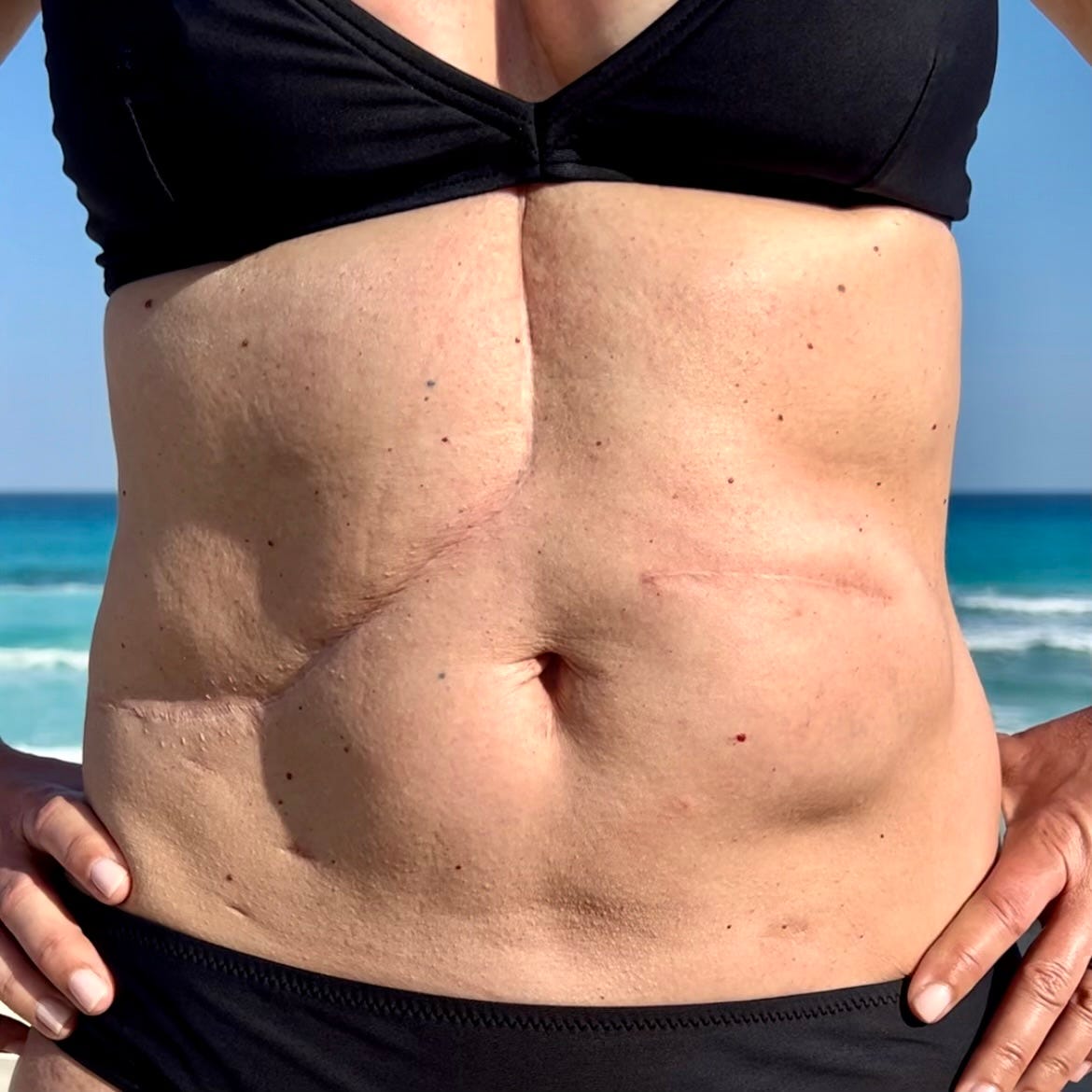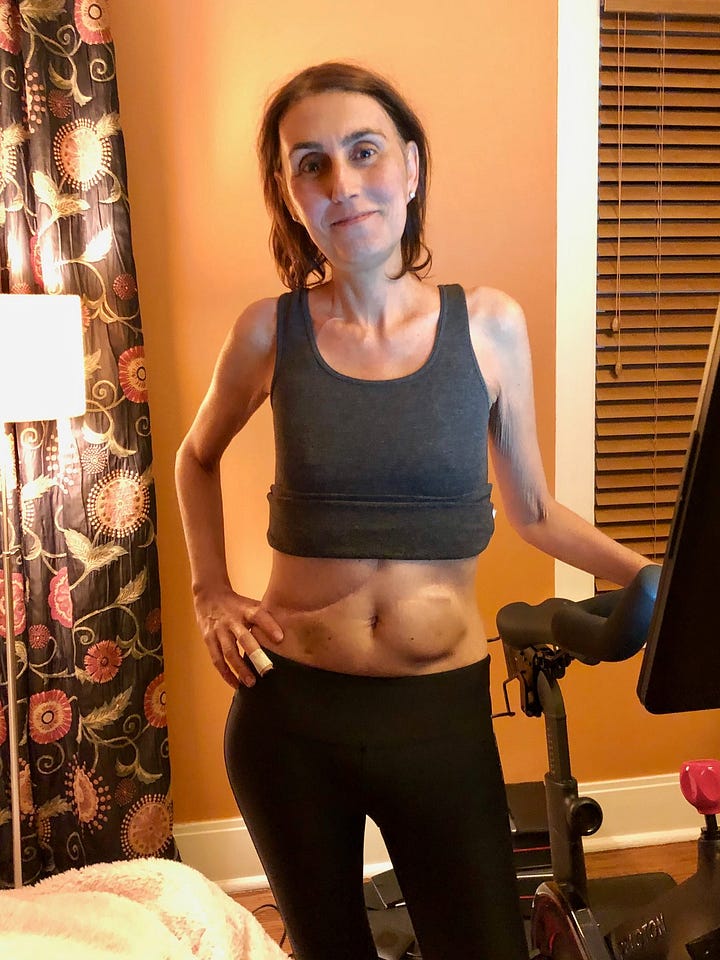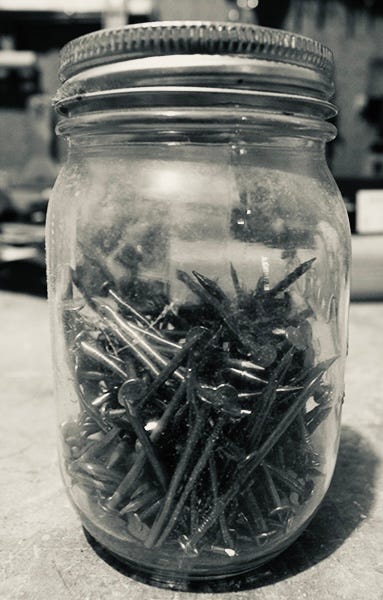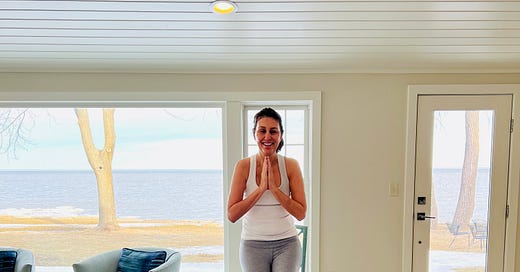Is there anyone who is reading this who does not struggle with the idea of self-care? “Put your own oxygen mask on first,” we are told, yet I don’t know of anyone who consistently does that, not even the person who said it to me most often.
My own experience with self-care required the urgency of possible, even likely, death; suggesting that only the question of survival is sufficient to pull my focus back to my basic needs.
This lesson of self-care has been a hard-won learning of my journey. During my year of post-treatment recovery, I made a conscious effort to protect regular naps, hired a personal trainer, and embarked on a twice-a-week Substack reflection habit. Consciously, I thought of these as investments in my overall healing, which they likely were. And subconsciously, I suspect I had come to believe that these commitments gave me control over my physical health. What would happen if I stopped?
So, I’ve been frustrated to find that the better I feel, the more apt I am to slip back into familiar patterns: working too late, eating comfort foods to soothe myself, revenge scrolling at a bedtime that comes far too late.
I’m not just frustrated, but a little scared, too.
The illusion of control is maybe dangerously potent, even if it is an illusion— “I’m clear, because I’ve been taking care of myself” can quickly become, “If I don’t take care of myself, I’ll get sick again.”
Perhaps like many of us, fear of bad doesn’t motivate me as much as hope for good. In fact, fear of bad can trigger avoidance completely (for example and particularly relevant: the number one barrier when it comes to pre-screening for common cancers is fear). So, I’m trying to spend more time thinking about the kind of life I am striving toward versus any toxicity I am trying to leave behind.

Nine months ago, I emailed the woman who is now my trainer. I was conscious of putting on too much weight, and being fully honest, bikini-related aesthetics prompted my outreach. I made progress quickly at first, then things felt like they plateaued for a while—until a few weeks ago, when I suddenly noticed how much stronger I felt. I hadn’t stepped onto a scale in a while, so I decided to check my weight, only to find myself five pounds heavier than when I last checked.

But, here’s the thing—I did not freak out! Nor did I beat myself up about eating too much over Thanksgiving.
Instead, my first instinct was to think: “Huh. I must be building muscle.”
In truth, it may have been part muscle and part Thanksgiving indulgence (those dark chocolate chip shortbread cookies Per has been making have been making regular post-dinner appearances). But the immediacy of my first thought being positive versus negative felt like important progress. I noted the shift and wondered how much my mindset had been impacted by listening to Cassandra encouraging me that I was getting stronger twice a week. I was certain it must have helped.


Then, a few days ago, I came across a list of personal goals I had made for myself in early October, after I wrapped up Strive for Five and was trying to figure out what was next for me: “Healthy and Strong,” read the first thing on my list. It caught me by surprise—I hadn’t remembered writing that down. But perhaps I had internalized it; because by the end of that month, I found myself returning a blouse I had purchased in September: it no longer fit—it was too tight in the biceps.
The past few weeks have been challenging—we’re not dealing with anything emergent, thankfully; but work is heating up while the kids need us to help them through one thing after another: anxiety, disappointment, a bean soup emergency. Per’s been busier at the end of the year than we anticipated, we’re having construction done in the kitchen, the contents of our cabinets are currently strewn across the dining room. The wreaths we bought for the windows are going on week number three (no, four) on the bench on our porch; takeout containers are piling up; chaos reigns and self-care is flagging.
But we’re protecting our workouts. Somewhere along the line, behavior created motivation (just like they tell you it does), and I find myself guarding—or proactively rescheduling—my twice-weekly sessions with the same commitment I hold for weekly therapy.
Writing, on the other hand, has fallen to the back burner. I told myself I’d write “almost” every week, then watched as a week off turned into two, three, four. I told myself that I was still writing, but writing speeches or for LinkedIn is writing for an audience primarily, not a true act of self-reflection. It’s just not the same, therapeutically, and I can feel my clarity clouding.
I recently heard someone describe discipline as the highest form of self-love: following through on commitments is a gift you give to your future self as opposed to giving into immediate gratification. I used to think about self-care as things that helped me to de-stress or escape in a given moment; reframing self-care as an act of love for your future self somehow makes it feel less optional, and more appealing.
For years, Per has tried to give me weekly manicures for Christmas—last year, he presented a handful of (metal) nails in a jar—but it never takes.

Today, I think I’m finally understanding why—and I’m realizing that weekly writing is the commitment to self-care I really need to give myself this Christmas.
What’s the self-care you’re gifting to yourself this season? And what have you learned about making self-care stick?!





My mum was diagnosed with Stage 4 colorectal cancer on Jan 2nd, 2024 and this substack is helping me a lot. From Madrid, Spain, Thank you very much for documenting your journey and show that there is hope!
New here but have also been working on allowing myself some grace to reframe regular writing as an act of self-care and not so much as work (though, you know, it can be). Also would love to hear more about the “bean soup emergency”, made me laugh. Hope the new year brings continued good health.